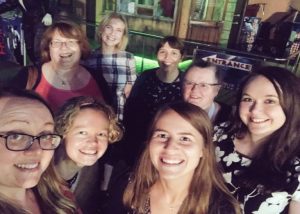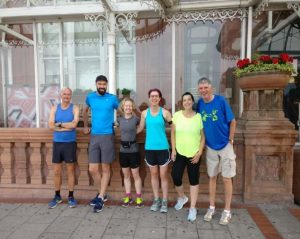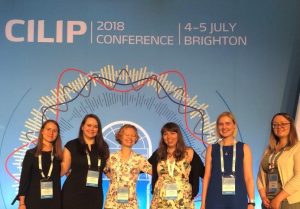CILIP Conference 2018, Brighton
Category: Blog
The following is a guest blog by Lynsey Sampson, University of Strathclyde.
I couldn’t believe my success in securing a bursary place to attend this year’s conference through CILIP’s Knowledge and Information Management (K&IM) special interest group. As well as looking forward to the actual conference, I was really excited that this year it was in Brighton as I had been for a trip there previously and absolutely loved the quirkiness of the place. To top it off, the exceptional summer weather that we were having in the UK stayed around for the conference and so it felt like a proper summer mini-break!
Networking and socialising opportunities
A key aspect of the conference for me were the opportunities for networking with other like-minded Library and Information Professionals. I decided to attend a pre-conference guided walk of Brighton the evening prior to the conference, organised by one of the special interest groups and led by a ‘blue badge’ qualified walk guide. As well as providing me with more of a familiarity of Brighton, it was the ideal opportunity to get to know other delegates. Afterwards, as a result, myself and five other delegates proceeded to find somewhere to have a meal together. We hit it off so much so that we swapped Twitter handles, becoming friends at the conference, and ultimately we have now stayed in touch with each other post-conference through the creation of our own WhatsApp group. I can honestly say that my decision to attend the walk resulted in much more of a worthwhile conference experience as I was able to share my conference experience together with my new friends, feeling much more involved in the conference this way.
Opportunities to meet others were further enabled at the conference through a welcome meeting point, with board games available to encourage engagement and interaction amongst delegates, as well as a workshop specifically on networking effectively. To me, this felt like a very positive strand to the conference format as I previously experienced a sense of nervousness at the beginning of the CILIP conference last year and had to initially really push myself to engage with others. I was pleased to learn of a ‘seafront run’ being organised for the morning of the second day of the conference. I felt committed to attend, even though the evening drinks reception on Brighton Pier with fish and chips and fairground rides was the night before, as I felt it was another opportunity to experience one of my favourite forms of exercise as well as being able to meet more people. Jo Wood, the creator of a newly established Podcast, ‘Librarians with Lives’, was also on the run. She had been doing a special conference Podcast on delegate’s experiences at the conference and I was lucky enough to feature in it. My enthusiasm for participating and the fact that I was the only professional from Scotland she has interviewed, has resulted in me being the feature of the next Podcast episode this September!
Break-out sessions
I really enjoyed soaking up the atmosphere and knowledge throughout the two days of the conference, especially the break-out sessions where I was able to specifically choose which sessions were closest to my interests. Two which I found very interesting were the seminars on both re-defining library spaces and also examining the engagement of information literacy. Both topics warranted ideas which could be applicable to my workplace.
In the session on re-defining library spaces, it was thought provoking to hear of two 21st century library buildings, The Hive and The Word, which have enabled the library to be much more of an inclusive space, embracing technology to attract more of a cross section of society. I was in awe at the photographs of both library buildings, each housing what seemed like state of the art technology – 3D Printers, temperature generated areas complimenting exhibitions being run, acoustic sofas, 360-degree digital immersive storytelling space, studio, and exhibition space – whilst also slightly envious that these new library buildings are still much of a ‘rarity’ at the moment and not something that we all experience when entering a library. I felt this session was worthwhile in providing a future vision into how these libraries work in practice. For example, the Hive is the first library building which is both a public library and academic library operating jointly. As my position is within an academic library, I found it interesting to hear how such a joint proposal progressed and now works in practice. The session inspired me to read up more on ‘The Hive’. I learnt that this type of library can have benefits for both the public and those studying or working within the university as demonstrated in this article within Science Direct.
Out of pure curiosity, I decided to attend the session on ‘Prison Libraries Change Lives’ as I have a personal fascination with this type of library and I have previously had the opportunity to attend the prison library at Carstairs prison. These libraries, like Carstairs prison library, demonstrate the ability to educate and transform prisoners, and it seems to me, act like a key part of the rehabilitation process. It was also eye opening to learn that there is a larger and larger prison population which is increasing in age, many of which are experiencing age related illnesses such as dementia, and the key role of the prison library in assisting with their mental health through activities generating discussion and interaction.
Unfortunately, due to unforeseen train cancellations on the Southern line, I was disappointed I was unable to attend the last break-out session of the second day and therefore the session on learning and information literacy became my last session. Within a few minutes of this session, I was quickly reassured that I had chosen a worthwhile session to finish on as all speakers on information literacy provided stimulating ideas and findings. Although not directly related to academic libraries, I particularly liked hearing about other sector’s experiences and approaches to information literacy. A key theme I took away from this session is the importance for instilling key information skills throughout society and working collaboratively to do this throughout all sectors. I felt astounded at the particular example given by Ruth Carlyle from Health Education that 43% of adults are unable to give the correct paracetamol dosage to a child after reading the accompanying information leaflet.
Keynote Speakers
I had mixed views on the keynote talks, finding that generally the speakers on the first day were more relevant and engaging than the second day keynote sessions. This, I imagine, was largely due to the subject matter and my own interests. Learning about the role of Penny Young, the House of Commons Librarian, and gaining a brief insight into what her role involves in such an interesting work environment, as well as hearing a motivating speech on professional progression from Sally Walker, Scotland’s library and information professional of the year 2017, really held my attention throughout. Hearing from someone like Sally, conveyed to me the real value of finding a library position that really compliments personality and interests. Sally certainly came across as someone who loved her role, relaying the creative ways she has connected with the local community as Children’s Librarian for Orkney public library. My favourite library initiative of hers, due to its cute factor, was the ‘Teddy Sleepover’, encouraging children to loan their teddy to the library, resulting in the teddies being captured on social media in different library scenarios! I could see from Sally’s impassioned speech, how much the award has meant to her. I was also very impressed by her outreach work, an example being contributing to ‘baby skills courses’ in secondary schools by educating teenagers on how to read books to really young children. She clearly deserved the award, given the amount of activities she was involved in to encourage library participation.
Overall impressions
From attending conferences in previous years, I would undoubtedly say that this year’s conference was by far the best in terms of the opportunities to socialise and engage with other delegates. I really enjoyed this and feel it added value to the conference.
As part of my bursary place was to actively tweet at the conference, I felt this was a good motivation to re-open my Twitter account and practice tweeting pre-conference. I found myself confidently engaging with the CILIP Twitter hashtag as well as forging connections with other delegates that I found within the LIS Twitter community. I actually felt this also added an extra element to the conference as there seemed to be always something going on through Twitter, even out with the conference hours, giving me a sense of always being connected to the conference experience throughout my trip. I plan to use my Tweets as evidence for my chartership submission.
I have already presented an information session to my colleagues as part of our training week on my impressions of 21st century library buildings, ‘The Hive’ and ‘The Word’ as well as my interpretation on the Information Literacy sessions and how certain ideas could be translated to our workplace. The question and answer session of my presentation generated interesting discussion amongst my colleagues on how we convey information to our customers and the idea of forging some form of partnership with public libraries. I also plan to include this presentation and report as evidence for my chartership too. I am truly thankful to the K&IM special interest group for giving me an opportunity that I will never forget.


